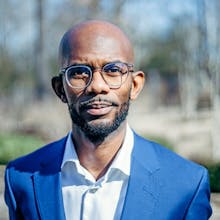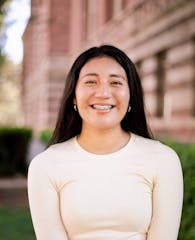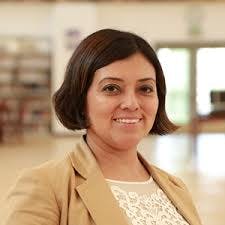UCLA Ed & IS Addresses Issues of Race, Justice and Opportunity at AERA 24
In setting the theme for the 2024 annual meeting of the American Education Research Association (AERA), UCLA Professor of Education and AERA President Tyrone C. Howard challenges the education research community to “engage in a massive undertaking of attending to the simultaneous act of dismantling racial injustice and constructing educational possibilities across P–20 systems.” This year’s theme asks researchers, practitioners, and policymakers to “imagine boldly what education spaces free of racial injustice can look like.”
UCLA students, research staff and faculty have responded. Almost 200 members of the UCLA community will travel to the AERA meeting in Philadelphia, April 10-14 to share their research on the impact of race and racism on educational opportunity, to illustrate the need for and power of equity and racial justice in education, and to offer ideas and examples of practices that can create new educational possibilities for all students.
Professor Howard leads the way, beginning with a conversation Thursday night with opening night keynote speaker Kimberlé W Crenshaw, a professor of law at UCLA and Columbia University who in the face of ongoing attacks on critical race theory will discuss her groundbreaking work on intersectionality and structural racism. Among other sessions, Howard will also chair the invited speaker session, “Lessons and Reflections From Ghana: Toward Justice and Freedom in the U.S. Education System,” with participation from UCLA’s Keara Williams, Demontea Thompson, Gene McAdoo and Jaleel Howard. And don’t miss Howard’s AERA Presidential Address Saturday evening, “Examining Our Past to Imagine a Better Future: Recognition and Redress of Racial Injustice in Education.”
UCLA Education Professor Eddie R. Cole addresses the urgency of the moment in Black Education, sharing his research “W. E. B. Du Bois and New Directions in Future Research on Black Higher Education.” Cole’s presentation offers commentary on more than 100 years of scholarship on Black higher education, including W. E. B. Du Bois 1898 article titled, “The Study of the Negro Problems,” and will make the case why AERA 2024 is the ideal moment to reflect on Du Bois and the scholarship of his contemporaries, while assessing new directions and possibilities.

“The study of the Black past is essential to making sense of the academy present. Black thinkers have long confronted the challenges of suppressed speech, global conflicts, and attempts to stifle how history is taught,” Cole says. “To have this discussion about Du Bois and other Black intellectuals as a presidential session during AERA is a testament to the urgency of the current moment in American education.”
UCLA Distinguished Professor of Education and Presidential Chair in Education and Diversity Sandra Graham also weighs in, taking part in the AERA presidential session, “Moving the Needle: Promising Practices and Innovative Approaches for Educators, Administrators, and Practitioners to Imagine Spaces Free of Racial Injustice and Dismantling the Preparation Pipeline.” The session will address the urgent need to create racially just educational systems that equip educators with the tools to grapple with and respond to racial inequities within their classrooms and schools. Graham will join with Deborah Rivas Drake of the University of Michigan to discuss research examining the benefits of community schooling as a promising practice for developing racially just schools.
Undergraduate students at UCLA are also taking part in the conversation at AERA.

In an invited poster session, third-year UCLA student and research assistant in the UCLA Center for Critical Race Studies, Sarahy Torres, shares her research, “Understanding the Experiences of Farmworking Children: Microaggressions and Microaffirmations Among First-Generation Latina/o Undergraduates at UCLA.” The research sheds light on how first-generation Latina/o undergraduates from farm working backgrounds navigate microaggressions and utilize microaffirmations as forms of resistance and empowerment within UCLA's academic environment. Torres’ study also proposes future directions, including expanding the research to include perspectives from graduate students who are also farm-working children, potentially providing deeper insights into the farm-working children’s experiences and coping mechanisms within higher education settings.

And in the invited speaker session,” Learning From Colleagues - Taking Action to Dismantle Racial Injustice” Leyda Garcia, associate director for professional learning at the UCLA Center for Community Schooling, joins in a conversation highlighting the work of colleagues acting to dismantle racial injustice amid significant legislative pushback on diversity, equity, and inclusion work. The panelists will speak to the legal, policy, activist, and collaborative approaches central to continuing the march toward social justice across P-20+ educational systems and share the expertise and perspectives of policy experts actively engaged in the effort to further diversity, equity and inclusion.
A partial list highlighting additional UCLA sessions addressing issues of race, equity, justice and educational opportunity includes:
“The Undercurrents of Institutionalization: How AANAPISIs Navigate a Racialized Process to Promote Pacific Islander Student Success, Demeturie Toso-Lafaele Gogue, Saturday, April 13, 11:25 a.m., PCC 2nd Floor Exhibit Hall A
“We Exist”: Dismantling Colonial Racial Injustice – The Possibilities and Promise of Indigenous Language Schooling, Teresa L. McCarty, Michael H. Seltzer, Kyle Hall Erby, Thomas Jacobson, Sun, April 14, 11:25 a.m., PCC Level 100, Room 111B
The Inclusive Classroom: A Path to Praxis for LGBTQ+ Educators and Students, Dariusz Ciszek, Thurs, April 11, 7.45 a.m. Marriott Level 4, Room 410
Lifting the Veil: The Role of Social Justice College Access Programs in Resisting Racial Discrimination in Schools, Jaylen Lowe, Thurs, April 11, 2.:30 p.m. Jaylen Lowe, PCC L 100, Room 103 A
Navigating Fronteras: How Physical and Symbolic Borders Manifest for Latinx Teachers in Schools, Julieta Rico, Thurs, April 11, 12:40 pm, PCC L 100, Room 105A
To find additional sessions by UCLA students, researchers and faculty please search the AERA 2024 meeting website.